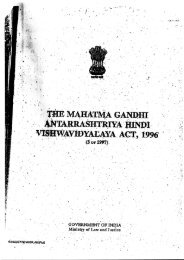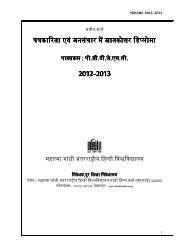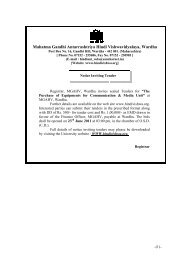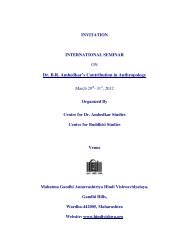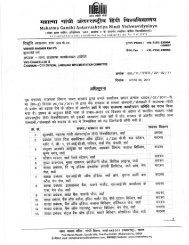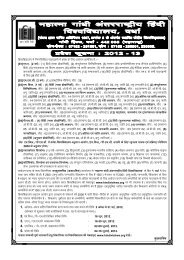fहndi - Mahatma Gandhi Antarrashtriya Hindi Vishwavidyalaya
fहndi - Mahatma Gandhi Antarrashtriya Hindi Vishwavidyalaya
fहndi - Mahatma Gandhi Antarrashtriya Hindi Vishwavidyalaya
You also want an ePaper? Increase the reach of your titles
YUMPU automatically turns print PDFs into web optimized ePapers that Google loves.
Prize. Wasn't it in the early years of thisvery century that we saw brilliant masterslike Premchand, Joyce, Stefan Zweig,Tolstoy and Chekhov ignored by the Prize?But it still remains a fact that the Prize isgiven to great masters of the letters fromacross the world — to such writers whoseliterary contribution is beyond questioning;whose art is peerless; who have portrayedhumanity's consciousness, faith, love,savagery, suffering, hopelessness, loneliness,displacement, and woes in such depths thattheir writing transcends the boundaries oftime and place and attains universalsignificance.In this book, Vijay Sharma haspresented before us the creative urges andpassions of fifteen writers who have beenhonoured with the Nobel Prize, at thefoundation of which are the lectures theygave in response to the Prize given to them.Just as the Nobel Prize, the Nobel lecturestoo have been accepted as important eventsin world literature because through theseeach writer shares with the world hispersonal reflections on such topics as histimes, the society, art and literature, valuesand ideals, the creative process andliterature, and so on. It is clear that eachof these lectures gives us material forunderstanding the literary work of theeminent author and its place in our life.Among the chosen writers we find, onthe one side, such masters as playwrightHarold Pinter and poet Pablo Neruda whoare advocates of social politics in their ownways and on the other, such novelists asIsaac Bashevis Singer, V.S., Naipaul, GaoXingjian, Toni Morrison and NaguibMahfouz who protest against looking atthe writer's art and the freedom inherentin it through the spectacles of a politicalor ideological thought system.The speech of each awarded writer isan outstanding statement but the words ofthe Chinese writer Gao Xingjian on thecontemporary and timeless issues ofliterature appear to be most powerful —as for instance, when he makes statementslike:"In order that literature safeguard thereason for its own existence and not becomethe tool of politics it must return to the voiceof the individual, for literature is primarilyderived from the feelings of the individualand is the result of feelings.""Controversies about literary trends or awriter's political inclinations were seriousafflictions that tormented literature duringthe past century."Once literature is contrived as the hymnof the nation, the flag of the race, themouthpiece of a political party or the voice ofa class or a group, it can be employed as amighty and all-engulfing tool of propaganda.However, such literature loses what is inherentin literature, ceases to be literature, andbecomes a substitute for power and profit."It is a fact that a writer like Xingjian isonly marginally known in <strong>Hindi</strong> thoughnot altogether unknown — this in spite ofhis winning the Nobel Prize. And to thiscategory belongs the name of Hungarianwriter Imre Kertesz at the source of whosecreativity are those hair-raising atrocitiescommitted in the concentration camps like156 :: April-June 2013fgndi •



